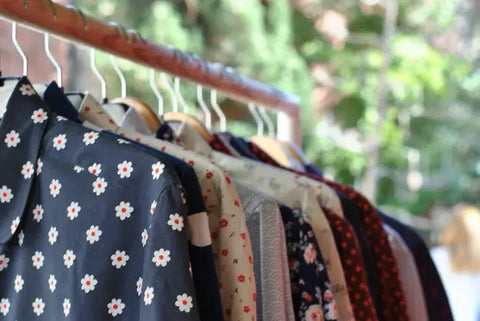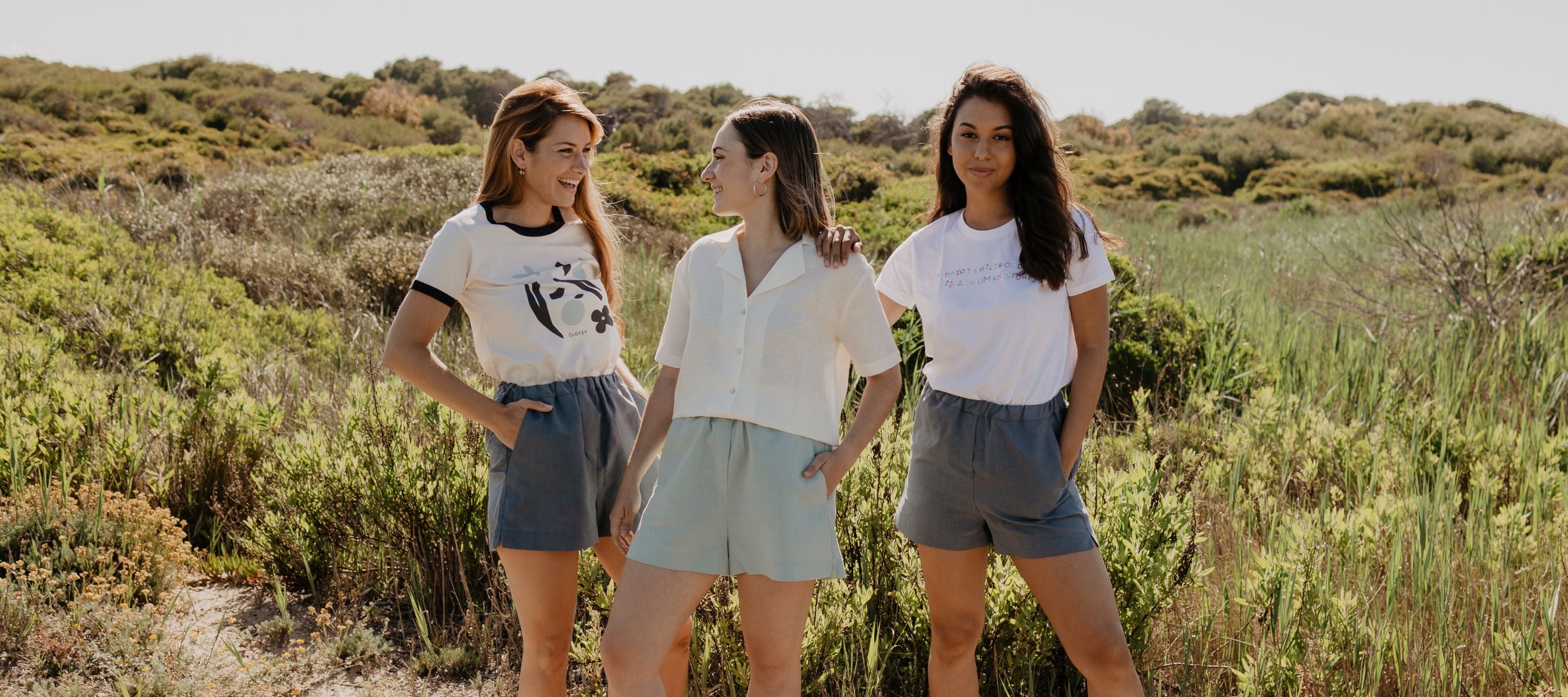In other articles, we have talked about sustainable fashion, slow fashion, ecological materials and many other topics. And in this article we are going to talk about vegan clothing and vegan fabrics. In addition, we will recommend you some vegan fashion brands, and we will show you tips to recognise them. Our aim is to give you all the knowledge you need to choose a more sustainable way of life.
If you've found this article, you probably want to know more about it. So let's get to it!
What is vegan clothing?
Vegan clothing is a highly sustainable garment that is not made from the slaughter or export of animals. No products from different species are used in its production. This is because it greatly promotes the protection of all living beings, being totally against its use for the realization of any type of garment.
This type of vegan clothing guarantees the use of 100% natural materials and not the use of animals at any time of its manufacture. These garments are made from vegetable fibres such as linen, cotton, synthetic fabrics, synthetic fibres, synthetic feathers, synthetic fur, recycled polyester, acrylics, cotton flannel, hemp, twill, nylon, recycled plastic, thermolite, rayon, microfibres, gore-tex, primaloft and polartec wind pro.
And, as we have said in different articles, let's remember that the fashion industry is one of the most polluting industries on the planet. For example, around 290 million cows are slaughtered for their skin year after year. If we analyse that number annually, we can come to the conclusion that the number of only cows slaughtered is enormous, not counting the number of different animals that are slaughtered to make specific garments.
Using natural fabrics is one of the best options used for vegan garments and not contributing to pollution.
What fabrics can vegan use ?
The vegan fabrics include: linen, lyocell, soy fibre, seaweed fibres, coconut fibre and organic cotton or recycled cotton. The number of brands or entrepreneurs who want to opt for vegan fabrics is enormous, because they are not interested in contributing to pollution, nor in the cruelty suffered by animals for large clothing productions.
- Lynen: these fabrics are extremely durable, with the ability to adsorb about 20% of their weight. It is a recyclable, biodegradable and hypoallergenic material.
- Lyocell: also known as tencel. It is produced from eucalyptus wood waste. It is a fabric that does not lose its quality easily and is as soft as silk. It is biodegradable and 100% recyclable.
- Soya fibre: a silky and warm fabric that offers long life and is completely ecological and biodegradable.
- Seaweed fibre: this type of fibre is produced from dried brown seaweed that is crushed and then ground. The benefits of this fabric are that it activates cell regeneration, detoxifies the body, prevents inflammation and itchy skin. Its fibres have the ability to absorb and let moisture escape, keeping you cool and warm at all times.
- Coconut fibre: this fabric is similar to rayon and is known to be very silky.
- Organic cotton: this material is used because it is not produced with harmful chemicals, uses less water, is much easier to care for and is very soft to the touch.
Which clothing brands are vegans?
Buying vegan clothing nowadays is much easier than it seems. Here are some highly sustainable vegan clothing and footwear brands
BeFlamboyant

This Spanish footwear brand, which offers totally ecological and sustainable vegan shoes with great durability, made from recycled materials. Its aim is to care for the environment and promote the protection of animals and individuals.
Bask Brand

Its garments are made from environmentally friendly materials, making a significant contribution by committing not to use products that worsen the pollution that large fashion industries have built up.
Clotsy Brand
At Clotsy Brand we make sustainable and vegan clothing from organic and locally sourced materials. We opened our doors in the middle of the 2020 pandemic and the #PlasticWarrior community that has been generated has been incredible.
Alohas

A sustainable clothing and footwear store that uses materials such as eco-friendly and plant-based leathers. Its goal is to create 0% waste that pollutes the environment and to fight not to contribute to overproduction.
Two Thirds

In Two Thirds they make their garments from recycled and sustainable materials. Using leftover fabrics from past collections to generate new garments.
Brava

With nature being so important to them, the best they can offer the world is sustainable designs made from natural fibers, renewable and recycled materials. Their product is of high quality and durability.
Velvet BCN

Velvet is a marketplace of sustainable and vegan brands. They offer ecological garments and products for the home, being their motivation to take care of you and the planet to build a better future.
Poppy

In this store you will find a wide variety of vegan products, from cosmetics, backpacks, jeans, t-shirts, household cleaning products, underwear, sneakers, among others, all absolutely sustainable!
How to know if clothing is vegan? PETA Certificate
To make sure that a T-shirt is totally vegan and free of animal abuse, it is important that you look at the materials used in its manufacture, such as pigments and glue.
The way to make sure that their compounds are organic, you must make the PETA certificate.
PETA, 'People for the Ethical Treatment of Animals', is an organization that fights to protect the life and rights of animals.
This certification certifies that no animals were used and that the production is completely slaughter-free, thus ensuring that the garments are sustainable and do not contribute to the pollution of the planet. This certification even ensures that in the future they will not use animals either.
This organization investigates where animal cruelty takes place around the world. They carry out scientific research to corroborate that the materials are totally organic, rescue animals and promote their protection.
For this reason, it is ideal for brands to have this certification. The approval of this important organization is essential. Thus, it will be much more reliable and sustainable for the user to purchase cosmetics, clothing and footwear that have the approval of this association.
What clothing materials are not vegan?
If you have reached this point and you already know what are the vegan materials. Now you should know what are the non-vegan materials. So many times if you are in doubt, you will know what not to choose.
The non-vegan components are the skins extracted from animal sacrifices, such as kangaroo fur, crocodile, fox, and leather, which is the skin completely free of hair. So is wool, extracted from sheep, silk, which is acquired from silkworms and butterflies. Even feathers are extracted from birds that are slaughtered.
It is important to note that non-vegan clothing is not only recognizable by having wool or animal skin at first glance. The glues and pigments used to glue the accessories and dye the fabric also have components that are derived from animals.
How to recognize vegan clothing?
We recommend a thorough investigation of brands that promote the protection of animals and the environment, using organic, recycled and biodegradable materials.
But if you are still not sure, here are 3 tips that you can take into account to recognize if the clothing is vegan.
- Check if the brand is PETA certified. All its products should have a "PETA approved" label which certifies that the garment is totally vegan.
- Check its labeling, read the components and corroborate that each of the materials are organic.
- In the case of sneakers, we recommend you to look under the tongue or observe in detail the inside, sometimes they usually place symbols of animals and specify that some material comes from an animal.
Conclusion
Now that you know how to identify it, start putting it into practice and look at the labels on all garments. Vegan clothing, made from natural and sustainable materials, help our planet by not contributing to massive pollution.
As we always say, raising awareness is the first step to slowly but surely living a more sustainable and stable life over time. Sustainability and veganism is not a black and white thing, to be or not to be. They are different things that little by little we discover and we can implement in the day to day in all our areas of life.
Vegan clothing stores will always be your best ally.













Leave a comment